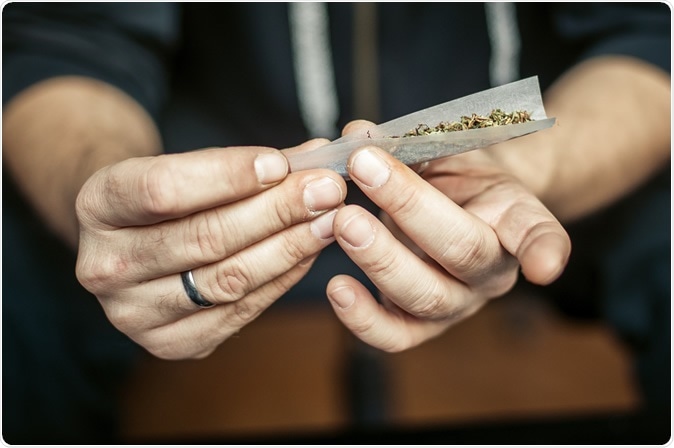A new study published this week has revealed that the use of marijuana or cannabis can implant false memories. The study titled, "Cannabis increases susceptibility to false memory," was published in the latest issue of the journal Proceedings of the National Academy of Sciences.

Cannabis increases susceptibility to false memory. Image Credit: GuruXOX / Shutterstock
The researchers at the Maastricht University in The Netherlands found that using marijuana could at least double the number of false memories or memories that never occurred in the first place.
Researchers led by Professor Johannes Ramaekers, a professor of psychopharmacology at Maastricht University, compared marijuana users with placebo users and noted this phenomenon. They explained that false memories are those recounting an event or detail which did not actually occur but is a result of a trigger from the environment.
The team explained that when a series of events take place, the insertion of a small detail from outside can often help form a fake or false memory. This is seen in all individuals, even without marijuana use. False memories are heightened when there is the use of cannabis. Ramaekers reiterated, saying, "We are all prone to the formation of false memories, independent of cannabis use. The susceptibility for false memory, however, increases with cannabis. Under cannabis, users can easily accept fake truths for true memory."
Elizabeth Loftus, a professor of psychological science in the department of criminology at the University of California, Irvine, added that this finding could be valuable in the perspective of the legalization of marijuana. She said that false memories could be significant in eyewitnesses and criminal matters as well as other issues such as interactions with friends, colleagues, and family. She said in a statement, "This new work is suggesting authorities need to be extra careful when interviewing somebody." She noted that "contamination of memories" should be taken into account. Loftus added, "There are lots of situations where somebody's memory matters. For example, a family dispute such as two siblings arguing about what happened in the past over a Thanksgiving table."
Ramaekers said, "Formation of false memories may alter the interpretation of work-related activities and social interactions with others." Loftus and colleagues found that there is an effect of misinformation and this has occurred in infamous criminal trials. She said, "It's easy to distort memory for the details of an event." She had been working on this for the past three decades and added that memories could be implanted in the minds long after the event has occurred.
The team explained that this was a placebo-controlled trial where both immediate and long term effects of intoxication with Δ9-tetrahydrocannabinol (THC) or marijuana was tested against a placebo. The study included 64 healthy volunteers. The participants were divided into two groups, with one group taking placebo and another group marijuana without their knowing the contents of their intake. The users were asked to use a Volcano Vaporizer to vape or inhale the marijuana or placebo. The amount in the vapourizer was regulated, and the participant smoked one whole balloon per dose.
Under the influence of the drug or place, their memories were tested immediately and again after a week. Three different methods were used to test for memories – the first was a list of associative words that were read out to them, and they had to repeat them back. The second and third tasks were visuals of virtual reality where the participants were asked to witness an event (for example, a fight on the platform while in a train compartment). Two scenarios were created – one as a virtual reality eye witness scenario and another as a perpetrator scenario (they become a student in need of money and steal a wallet in virtual reality).
Results revealed that those who were intoxicated had a higher number of false memory insertion compared to those who were on placebo. In the associated word list, those on marijuana had a higher level of false recognition (saying a word was on the list when it was not). This false recognition or false insertion of words was seen both immediately and after one week of the intoxication. False memories were observed in both the virtual reality scenarios among those using marijuana. Ramaekers said, "This study showed that cannabis increased the number of false memories across all three memory paradigms." It could be due to the activation of the hippocampus - the memory center of the brain, wrote the researchers. Ramaekers said that there might be a "fragmentation of thought, loosening of associations and heightened distractibility," with marijuana that could be causing this phenomenon. First author Lilian Kloft, a psychopharmacology researcher at Maastricht University, said that this also meant that persons under the influence could admit to committing a crime they did not commit.
The team wrote in conclusion, "Cannabis seems to increase false-memory proneness, with decreasing strength of association between an event and a test item, as assessed by different false-memory paradigms." This, wrote the researchers, could have an impact on police interviews of suspects as well as eyewitnesses high on marijuana.
Journal reference:
The contribution of cannabis use to variation in the incidence of psychotic disorder across Europe (EU-GEI): a multicentre case-control study Di Forti, MartaAmoretti, Silvia et al. The Lancet Psychiatry, Volume 6, Issue 5, 427 - 436, https://www.pnas.org/cgi/doi/10.1073/pnas.1920162117